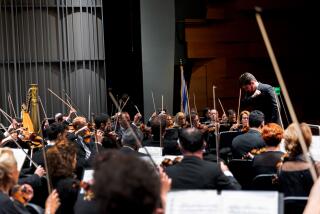Music Reviews : Compositions by Weiner & Wyner at Gindi Auditorium
- Share via
Sunday night at Gindi Auditorium, the music of Lazar Weiner and Yehudi Wyner (father and son) probed--with profound depth of feeling--an open wound: that betrayal of universal Jewish consciousness caused by willing submersion of identity, or assimilation.
It was not a lighthearted evening, but some musical treasures of uncommon impact were revealed.
Weiner’s songs aim past mere self-expression. As a body of work they attempt to enshrine in sound a culture and a language (all are to Yiddish texts) the composer saw being eroded.
“Tzela-Tzeldi” (1918) owes a debt to Debussy. “Three Heschel Songs” (1973), portraying the inextricability of God from Eastern European Jewish daily life, are musically stark and spare.
Wyner’s pianistic authority graced 17 of his father’s songs, including the cycle “Kleyne Nacht Musik,” which added flute, oboe and clarinet. Soprano Jennifer Trost’s vibrant vocalism lent operatic dimensions to those she sang; mezzo Anne Marie Ketchum’s slenderer means brought equal satisfaction.
Weiner’s occasionally Gershwinesque “Three Preludes for Piano” (1932) make real virtuoso demands. Wyner played them with uncompromising energy, deep respect and the love available only from one to whom this work had been dedicated at the age of 3.
Wyner’s own works proved powerfully expressive: “Memorial Music,” a striking setting of English texts for soprano and flute trio; “Dances of Atonement,” an achingly emotional Yom Kippur observance (violin and piano), and “Tanz and Maissele.” Here, the incandescent playing of violinist Mark Kashper, cellist Barry Gold, clarinetist David Howard and pianist Wyner provided soaring lyricism alongside impassioned bravura. All West Coast premieres, each piece deserves a rehearing, soon.
More to Read
The biggest entertainment stories
Get our big stories about Hollywood, film, television, music, arts, culture and more right in your inbox as soon as they publish.
You may occasionally receive promotional content from the Los Angeles Times.









